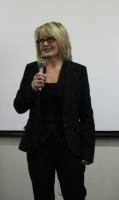
“Despite having an aversion to presenting myself as a woman first and foremost, it is incumbent upon me to silence the corporate clamour of being a woman,” says Justice Belinda Hartle of the Bhisho High Court.
With a talk entitled “Women in law who the heck do we think you are?” it was clear whom she was addressing: young women about to embark upon the “bumpy ride” of becoming law officers. The occasion was a joint initiative of the Rhodes Law faculty and the Office of the Chief Justice.
Currently occupying the Office of the Chief Justice in Port Elizabeth, Ms Hartle is passionate about motivating young people and sharing her experiences. These include having been appointed as small Claims Court Commissioner, a human rights litigator and an honorary member of the Grahamstown rape crisis centre while practicing at Mark Nettelton’s attorneys in Grahamstown.
No stranger to Rhodes, she served as presiding officer in the moot room during the faculty opening in 2011. Having completed a B.Juris Degree at the then University of Port Elizabeth as a recipient of a Justice Bursary, she has served on the bench of the Port Elizabeth Bar of Advocates since 2002.
“I have tried to pursue my own struggle in the judiciary outside a gender context, she said. “My self-worth is not rooted in my gender, but in my capacity as a judiciary.” Candid and unassumingly entertaining, she invited her audience to ask questions about gender conflicts they may face in the workplace and classroom.
She paid tribute to the Office of the Chief Justice’s initiative to encourage and affirm young practitioners and expressed her hope that this interest would extend to offering bursaries and scholarships in the future, besides existing training to equip women with judicial skills.
“Why can’t some of us stay the course and achieve the same successes as men?” she asked. In a world beset with gender-based violence, “which has no race, class or professional bias,” she questioned the “skewed view” that women are unfit for the demands of the judiciary, using both recent and current examples.
Citing Margalynne Armstrong’s Meditations on Being Good (1997), she described how when Armstrong joined the faculty as professor at Santa Clara University of Law, two black woman introducing themselves to her exhorted: “Girl, you’d better be good!”
Analysing the various meanings of this statement, she came to the conclusion that “men are unlikely to be warned ‘to be good.’” Ms Hartle added that: “Most often these words are uttered mostly silently, for those who break through yet another glass ceiling.”
She urged the students to seek advice from a mentor when entering the legal profession, “someone who is actively and intellectually involved” as opposed to a role model, whom one often admires from a distance.
She invited her audience to contact her as she enjoys sharing her experiences and lending assistance, emphasising how those who have succeeded have a moral responsibility to pass on their skills and experience.
Discussing the male personification of the judiciary, right down to the dress code, when Ms Hartle joined the PE bar in 2001, there were only three female members, a marked difference from the present day, where at least a third of its members are women.
“As we evolve as a non-sexist society, we are going to be less and less aware of our differences,” she said, recalling a joke that local advocate Dave de la Harpe had made while articled to Netteltons in 1989: “...but you’re not really a woman!”
Referring to Carol Gilligan’s distinction between men as “rights-based moralists” and women as “care-based moralists,” the latter striving to use care and connection to find a compromise position and answer the needs of the greater number of people.
Quoting from Thinking Like a Lawyer: Gender differences in the production of professional knowledge, she said: “A number of feminists who has written have noted that women tend to be relational rather than adversarial, co-operative rather than competitive and emotional and intuitive rather than strictly rational.”
Returning to the title of her talk, she said a compelling challenge for all women is to gain confidence in their ability. “When asking of another, who the heck do you think you are? that person is invariably asking, what am I not?” and we should not begin with the premise that we have a disability because we are not men.”
“I hope you will answer that you are worthy and equal to the task.”
Photo and story by Anna Karien-Otto
